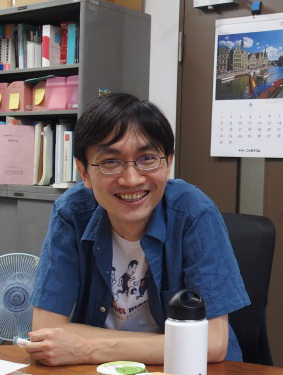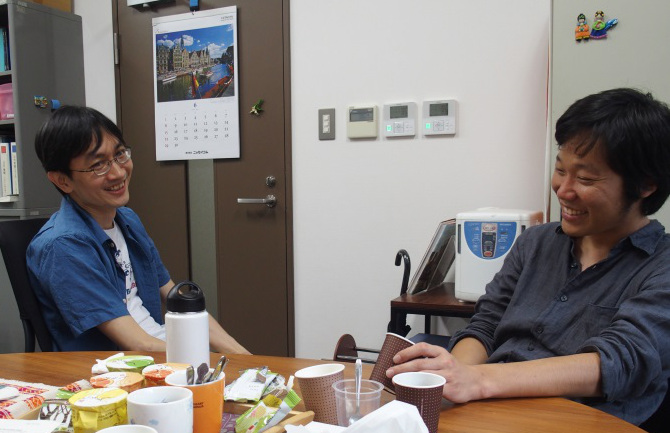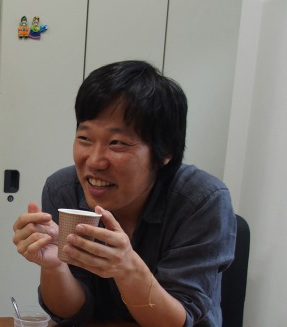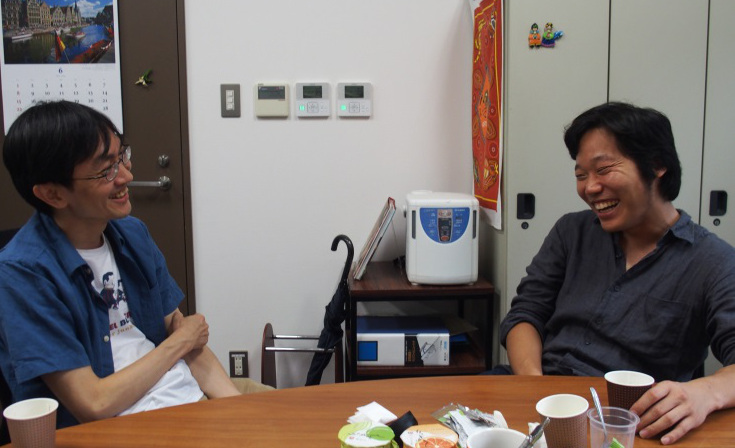客員ファカルティーにインタビュー! 第2回
Meet Dr. Dong Woo Yoo and Dr. Tuan-Hwee Sng, Visiting Researchers!
The Institute recently has invited the two outstanding young researchers for 3 months stay. They are from different parts of the world but has been reunited for the fourth time in their walks of life, under their mutual interest in their academic fields.
Dr. Dong Woo Yoo is from West Virginia University (USA). His research interests include economic history, institutions and economic growth, and property rights and financial development in Asia.
Dr. Tuan-Hwee Sng is from National University of Singapore. His research interest includes economic history, political economy, and applied microeconomics.
Meet Dr. Dong Woo Yoo (DW) and Dr. Tuan-Hwee Sng (TH), and learn how they enjoy their research lives with us at the IER!
Growing up in different parts of the world.
Q: Please share your childhood stories.
DW: I was born in South Korea, and have two younger sisters. I liked playing outside when I was very small, but once I entered elementary school, I began and continued to study very hard to get into a good school. In my high school days, I went to school at 8:00am, coming back home after 1:00am almost every day. This was the typical student’s life in South Korea. But once I got into Seoul National University, life there was completely different from the ones before. I had my military service at the age 21 for 2 years and 2 months, during the time of my university days.
TH: I was born in Singapore. My childhood was less regimental and more relaxed. I enjoyed my school days. In my junior high school days, I went to school at 8:00am and returned home at around 1:00pm. For upper high school, I returned home at around 3:00pm, so not too bad. I also did military service, at the age of 18 for 2.5 years, where I met many people from different walks of life.
Q: When and how did you first think of taking economics as your major and then become a researcher?
DW: In my case, the path was already there to take, because in South Korea, there are strict ranking on the university and its departments, based on your scores. The highest was Seoul National University’s law department, followed by the economic department. I had to take the economics major almost automatically, and being young as a student, I never thought that the choice I made would become very critical in the long run.
Then, one day, in my senior year, one of my professors recommended me to go for the Ph.D. in the United States of America. Due to my financial reasons and some interest to the business world, I hesitated, however, with a strong recommendation, I took this chance to move over to the US and continue my studies at the Ohio State University who offered me a full scholarship.
TH: When I entered upper high school, I wanted to improve my English, so I took economics because the subject required me to write essays and at the same time the training emphasized logical thinking. And once I began studying economics, I became very interested in it.
After I graduated from university with a degree in economics, I worked as a journalist for several years. The job was very interesting and I had the opportunity to work in mainland China. But at the same time, I firefight a lot and spent all my time chasing all kinds of news stories. I would report a different news story each day and there was little time for me to think about the meaning behind each story. At some point, I become quite comfortable with that life and began to fear losing the habit to think. So I went back to academia to do a Ph.D.
When our paths of life crossed.

Q: When and how did you meet each other?
TH: We first met at the Economic History Association Annual Meeting in Tucson, Arizona, in 2009, followed by another conference in Evanston, Illinois in the same year.
DW: We were both graduate students from different universities back then.
TH: Then, we met again in 2011, at the AEA Annual Meeting in Denver, Colorado, when we were both looking for jobs. So this is the fourth time that we meet each other.
DW: We emailed from time to time. I cited his paper in my dissertation.
Q: So you are both interested in Japanese history. When did you first become interested in?
DW: In my case, during my high school days, since Korea and Japan have some past relationship issues to overcome.
TH: I have always been interested in history. My knowledge on Japanese history improved a lot when I was working on my dissertation. Eventually, I wrote a chapter with Chiaki Moriguchi sensei comparing political institutions in early modern China and Japan. Historically, institutions in Japan shared many similarities with those in China, and yet they were different in subtle ways. I find this very interesting. The ability to read Kanji characters allows me to access materials in Japanese relatively easy.
Living in Kunitachi, a “héxié” city.
Q: What do you like about living at the Kunitachi International Guest House of Hitotsubashi University?
DW: I really like living here. The building is new, clean, well managed, and yet the price is affordable. My single room is fairly small, but I am happy with it.
TH: I really like it, too. It’s well managed. Also, the neighborhood is clean and quiet, with lots of greenery. And going to central Tokyo by public transport is very easy.
Q: How do you like living in Kunitachi, then?
DW: I think it is a lovely town to live! Safe, convenient, efficient with bicycles, well managed community, nice restaurants! I am a big fan of our campus, too!
TH: I, too, think so! It is very convenient to live here. Easy to get things that we need and at affordable prices. The food is of good quality and cheaper than in Singapore. One particular thing that I like about this town is that the environment and the people seem to blend together in a very nice way and you can see it from the faces of people. They look so contented. There is a Chinese term for this, 和諧, héxié, which means harmony. I see many people here, from the seniors to the babies, and in fact their pets as well, living harmoniously and enjoying the environment that they live in.
Q: What about our institute?
DW/TH: We think it’s an amazing institute, with good services, well organized support, and unbelievably kind staff!
Going global as researchers, towards the future.
Q: Please share some differences between your universities and Hitotsubashi.
DW: The biggest difference may be, the dress code of the faculty members, we are more casual in the United States. Also, university libraries tend to be opened more hours for students. And of course, the transportation tools are basically cars, not bicycles. I feel college sports are much more focused on as major activities of a university in the United States than in here. Vacation period tend to be longer over there, too.
TH: One big difference between this university and mine is language. In my university, we use English. Another difference, the faculty composition. Our faculty members are mostly from foreign countries, only a few locals. This is natural. Since Singapore is very small compared to Japan, communication with the outside world is very important. Otherwise, we will be isolated. In Japan, you have the critical mass. We have only 4 universities in Singapore.
Q: Given a chance, would you like to come back again?
DW/TH: A big YES! Definitely!
Q: Please share briefly about your current researches.
DW: I am currently working on the relations between mapping and economic development, how the map making and the map making related technologies had improved the economic development. Since maps are the collection of all the spatial information in any time of human history, the efficiency in collecting and processing spatial information had turned out to be critical for one’s economic development. For example, the information on where to make new roads, new railroads, good places for farming, etc. The point is, when those spatial information is systematically organized and controlled by the central government, chances are to enjoy more efficient economic development. It is also closely related to property institutions as well.
TH: My research area is where economic history and political economy overlap. I have a few projects now. One of them is how geography affected political institutions in China and in Europe and how that in turn shaped their patterns of economic development. For example, historically China was often a unified country, while Europe was often divided into many countries. Did unification in China and decentralization in Europe create any differences in their paths of economic development?
Q: What will be your lifetime research theme, do you think?
DW: Basically, it will be about institutions and economic development.
TH: It will be always the overlapping of economic history and political economy. I also want to understand how geography influenced historical and economic development. So, geography, history, and economics, how the three interacted with each other and helped shape the world that we live in today.
Q: Do you have anything you wish to accomplish within your lifetime, other than researches?
DW: There are a lot of things. I wish to keep up my good health as a priority, and then, I have my Japanese studies to complete which I have started here in Kunitachi. I value a lot in keeping on playing tennis, which has brought me many gifts in life, such as good health, many friends, and a joyful life.
TH: Nothing much. I have many things to be thankful for already, most of all, my family. They have given me so many good things in life and I feel very fortunate.
Q: Please share some encouraging messages to the young researchers studying in the same field.
DW: I would say, do your best, in any time of your life.
TH: I would suggest that you do the research that interests you the most. Often people choose their research topics based on the immediate rewards. Doing research based on interest might be a hard path to take. You are unsure if there is anyone who will appreciate your work. But then Japan is a developed country, there are safety nets around. If one does not do well, it is not the end of the world. So it’s good for your society that you do what you like. That way, the quality of your research is likely to be higher too.
Q: Last but not least, please share your thoughts about Japan to become better, to survive in the global society.
DW: I think influencing the rest of the world with animation and manga culture is a very good thing. There are many people around me in the United States who are interested in Japan, and are actually influenced by this culture, which has brought their primary interest in Japan. So, keep up the good work, I would suggest, this movement can become good ambassadors of Japan.
TH: Japan is a rather equal society, which is good. Inequality is generally higher elsewhere, so Japan is very unique. But at the same time, it would probably be good if you allow more outsiders into your society. This may cause you your uniqueness at some point, so you need to find the balance: how to be more globalized but at the same time not lose the things that you value most.
We thank Dr. Dong Woo Yoo and Dr. Tuan-Hwee Sng for this precious occasion, sharing their stories and views, providing the essence in life to live better. We sincerely wish both of them for the very best in their future endeavors.
Interviewed on Thursday, July 3, by CEI staff, Akiko Ito, Cindy R. Suzuki, and Nozomi Wayama.





